Europe in the Driver's Seat

Climate change, new socio-economic models, digital transformation... Europe and its citizens are living through an intense and complex age due to the rise of major stakes afflicting all aspects of society. In these uncertain times for our blue planet, the European Union, through its institutions, aspires to become the powerhouse of a sustainable model and redefines its development strategies. How is it progressing towards this ambition? The goal is to drive the continent towards a low carbon and inclusive society, steering it to be resilient to future challenges. At a time of renewal for the European institutions, we dive into the Union’s initiatives toward the construction of a durable future.
Prosperity and sustainability, an European signature
In the European Union, as a whole, 500 million people live in favourable socio-economic conditions. However, the resources mobilised to reach and maintain this quality of life undeniably have high environmental costs and impacts. Today, if people across the globe consumed as much as Europeans, we would need 2.86 planets to sustain their needs! As such, Europe’s future is intrinsically tied to its capacity to face these challenges.
By taking interest in the ties between the European Union and sustainable development, one quickly grasps that the latter is deeply embedded in the very DNA of Europe’s construction. This vision is made particularly explicit in the Maastricht Treaty of 1992: “The Union aims to promote peace, its values and the well-being of its peoples 'shall work for the sustainable development of Europe based on balanced economic growth”.
Furthermore, the adoption in 2015 of the United Nations’ 17 Sustainable Development Goals (SDG) by the European Union and its member states reflects the acknowledgement that the status quo is unsustainable. Through this medium, the EU commits to the implementation of the necessary adaptations to reverse contemporary global trends driving negative repercussions on the economic, social and ecological outlook of future generations. Growth, employment, well-being, natural capital, social cohesion: the need for change has been recognized as a universal and solidary challenge. The signature of the Paris Agreements for the climate the same year allowed the EU to reinforce its stance and to affirm its vision for a sustainable future.
Civil society has also seen calls to action for a more sustainable development. European citizens are making themselves heard and affirm their willingness to move towards a socio-economic environment more attuned to climatic stakes. Student protests for climate justice in 2019 have been particularly prominent across Europe, with over one million students across 1851 cities! Another significant indicator is the outcomes of the latest European parliamentary elections: the Greens/European Free Alliance now holds 74 seats in Strasbourg, making it the fourth-largest representative group. Citizens are now clearly demanding that sustainable development be placed high up on the European agenda.
But if the vision seems laid out and the context particularly pressing, how are the EU’s commitments being translated into concrete actions? How is it implementing the necessary changes? What are the milestones already achieved, and more importantly, what challenges await tomorrow’s Europe? How can European policy become the driving force for a sustainable future?
The colossal work done by the institutions toward sustainable development the past few years remains underrated and drowned under the ambient Europe bashing. Teams nonetheless work relentlessly to push forward the issue through a wide range of directives and other plans to impulse change across the Old Continent. Zoom on five key breakthroughs.
-Toward a sustainable Europe: key breakthroughs since 2015-
25th September 2015 : Adoption of the United Nations Sustainable Development Goals by the European Union in collaboration with its member states
2nd December 2015 : European Circular Economy Action Plan (COM/2015/0614)
5th October 2016 : the EU ratifies the Paris agreement on climate change adopted in December 2015 during COP 21
17th may 2017 : Regulation on conflict minerals (UE regulation 2017/821)
17th november 2017 : The European Pillar of Social Rights Floor is jointly approved by the European Parliament, the Council and the Commission during the Social Summit for Employment and Inclusive Growth
4th march 2019 : EU Commission comprehensive report on the Implementation of the Circular Economy Action Plan (COM(2019) 190 FINAL)
4th april 2019 : Adoption of the directives on the conciliation of work-life balance (COM/2017/0797-2017/0355(COD)) and working conditions (COM/2017/0253 final-2017/085 (COD))
16th may 2019 : 10th annual Forum of the European Platform of Diversity Charters
5th june 2019 : Adoption of the directive on the reduction of Single-use plastic (Directive 2019/904/UE)
18th june 2019 : Update of the directive on Extra-financial Reporting (Directive 2014/95/UE)
15th march 2021 : Commission sets research and innovation priorities for a sustainable future in the 2021-2024 Strategic Plan for "Horizon Europe", the EU's new research and innovation programme
21th april 2021 :
* European Climate Law. The Council and Parliament reach a provisional agreement defining in law the objective of a climate-neutral EU by 2050, as well as a collective and net target of reducing greenhouse gas emissions by at least 55% compared to 1990.
* The Commission proposes new rules and actions to make Europe the world's trusted hub for artificial intelligence. Europe wants to adapt to the digital age.
* The Commission presents the implementing decree for the Taxonomy
Ambitious measures for a circular economy
Promoting non-linear models of production and consumption has been a key priority established by the previous Commission. In December 2015, it adopted an action plan detailing 54 measures to accelerate Europe’s transition toward a circular economy (“Circular Economy - Closing the loop: An Ambitious EU Circular Economy Package” – COM/2015/0614). This initiative aims to promote innovation as well as to encourage growth and the creation of new jobs.
Through the implementation of this plan, the EU endeavours to alter prevailing modes of consumption and production, focusing on the conception of products (resilience, reparability, reusability and recycling), waste (prevention, recycling, energetic valorisation, landfill) as well as the education of consumers.
Five key sectors were identified in Europe’s action plan to accelerate the transition across the entire value chain: plastic components, food waste, critical raw materials, construction and demolition, and biomass and biomaterials.
In March 2019, the European Commission published its report on the progress of the implementation of the action plan for a circular economy (COM(2019) 190 final). In this report, we learn that in 2016, the sectors related to the circular economy already employed over 4 million workers. This represents a 6% increase in 4 years. Besides, economic ventures based on the circular economy such as repairing, reusing and recycling activities generate close to 147 billion euros in added value, and around 17.5 billion euros in investments in Europe.
EU commitments on conflict minerals
The regulation on conflict minerals adopted on May 17th, 2017 by the European Union (Regulation EU 2017/821) requires oversight and control of the entire supply chain for tin, tantalum, tungsten and gold imports into EU member states. Used for the manufacturing of numerous high-tech devices, as well as the creation of jewellery, these minerals are in the viewfinders of the EU for ethical questions, notably the protection of human rights. Indeed, in certain conflict zones, armed groups resort to forced labour to extract these raw materials which they then sell to finance their criminal activities.
The EU regulation was established to ensure that minerals bought or sold by European stakeholders do not represent potential sources of financing for armed groups, to the detriment of civilian safety in those areas. In practice, this new regulation holds European importers accountable to ensure that the minerals they bring into the European Union have been extracted and refined responsibly.
Since the adoption of this regulation, and ahead of its effective implementation from January 2021 onward, the European Union has already launched initiatives through its program on minerals for sustainable development, in partnership with the African, Caribbean and Pacific group of states (ACP) and the United Nations Development Program. Another effort is being led by the signature, in October 2018, of the Mosi-oa-Tunya Declaration on sustainable development in artisanal and small-scale mining by 72 nations during an international conference on the issue in Zambia.
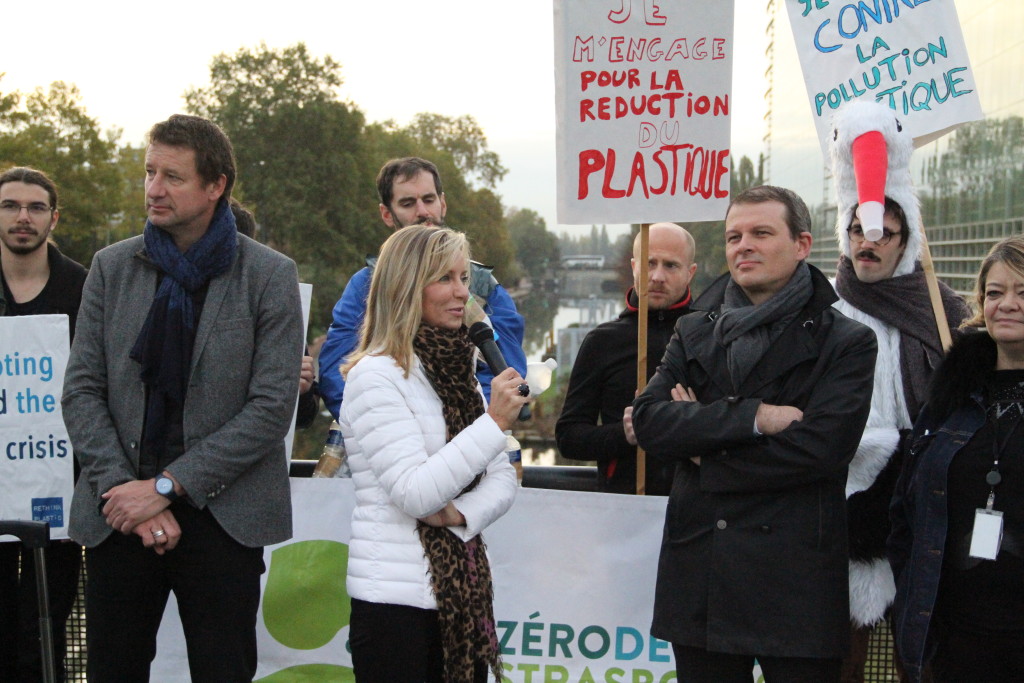
MEP Frédérique Ries, rapporteur for the directive on single-use plastics, is a campaigning for the cause on the eve of the vote in plenary.
Towards zero single-use plastics
A breakthrough in Europe’s sustainable development agenda which has drawn a lot of attention – as it has in Luxembourg – is the directive on the reduction of the environmental impact of single-use plastic products. It was adopted on June 5th, 2019 by the European Council (Directive 2019/904/EU).
From straws to plastic cutlery and cotton buds, this new directive – enforceable from 2021 – involves the complete suppression of the single-use plastic products which most pollute European waters and beaches. This measure also introduces restrictions in terms of cleaning and waste management. Financially, this commitment could lead to savings of up to 22 billion euros for members states by 2030, and places the EU in pole position globally when it comes to fighting the many negative environmental impacts linked to plastic pollution (find more information on the commitments of IMS members who signed the Zero Single-Use Plastic manifesto page 90).
“United by Diversity”
A pillar of the European Charter on fundamental rights (2000/C 364/01), the promotion of diversity represents a complementary aspect to the bodies for the promotion of equality created following the legal obligation arising from the Racial Equality Directive on equal treatment without distinction for race or ethnic origin (Directive 2000/43/CE) as well as the Employment Equality Directive on equal treatment with regards to work and employment (Directive 2000/78/CE) adopted almost 20 years ago.
The European Union is invested in this issue through, among others, an internal HR strategy for managing diversity for all European civil servants, as well as through the European platform of Diversity Charters created in 2010. This platform provides a space to share experiences and best practices between national Diversity Charter chapters through regular meetings, expert-led seminars and an annual high-level forum. The European Commission also supports this movement by financing small scale projects. Thanks to these efforts, 24 member states have their Diversity Charters. Thousands of companies have thus analysed and optimised their RH processes to implement practices fostering the improvement of working condition, better integration of newcomers, the training and awareness-raising across all organisation levels and the taking into account of diversity in career management plans and hiring strategies.
On May 16th, 2019, the European Commission held the 10th edition of its annual forum of the European Platform of Diversity Charters. This event brought together European politicians and civil society to reflect together on the implementation of new concrete measures – its action plan to move forward on the equality of LGBTI persons, for example – to pursue the evolution of the European Union toward an equal society united in its diversity, as stated in its motto.
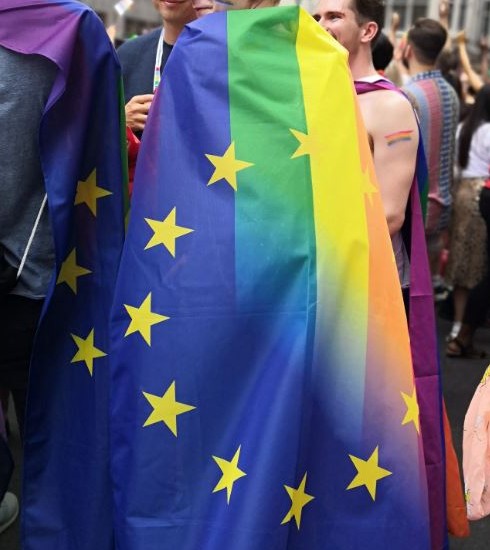
Improvement of working condition for a more social Europe
Considering the rapidly evolving world of work, the European Parliament, Council and Commission have jointly approved a European pillar for social rights on November 17th, 2017, during the Social Summit for employment and inclusive growth. The same year, the European Commission has proposed two directives for the optimisation of work-life balance and working conditions (COM/2017/0253 final – 2017/985 (COD)) and COM/2017/0797 final – 2017/0355 (COD)).
With the adoption of these two directives by the European Parliament on April 4th, 2019, companies will have to, from 2021 onward, guarantee their employees more extensive social advantages. This concerns the extension of parental and maternity/paternity leave, the increase of indemnities, or more flexible working hours to better reconcile work-life balance. Moreover, the employment relationship of the worker will need to be negotiated with the employer clearly and transparently, especially in terms of employment contract, probation periods, double employment, training and working conditions.
Opportunities and challenges of tomorrow
The EU is thus progressively putting down the milestones crucial to its sustainable development and enables the acceleration of its member states’ awareness of social and environmental imperatives. Many of them, one must admit, would have otherwise remained on the side-lines on these matters. However, the displayed ambition reaches far beyond. What about Europe’s future challenges, to keep moving toward a sustainable future? From climate change to demographic change and technological progress, the last years have rendered the world increasingly complex and subject to rapid mutations. This acceleration is synonymous with both opportunities and challenges! To take them into account, the EU has put forward several priorities in its 2019-2024 strategic agenda.
An ambitious agenda
At the heart of this strategy are environmental, social and economic pillars, working together for the construction of a resilient, equal and competitive Europe. It includes measures for a farm to fork European food chain to generate less food waste, as well as supporting farmers and healthier food habits. An urgent issue to tackle, considering that today, each European wastes about 173kg of food per year, which represents a financial loss of €200 per person – at the EU scale, that’s over 100 billion euros of food produced but discarded!
Alternative mobility and construction solutions based on low energy consumption are also a key strategic focus of the EU for increased sustainability. Critical indeed, when we know that mobility and transport represent 27% of GHG in Europe and that real estate tallies up to 40% of the European energy consumption.
The social and economic transition of Europe is not neglected; many measures that are taken into the European Commission’s “Horizon Europe” proposal concern the long term budget and priorities for the Union between 2021 and 2027. It refers to a range of focuses, particularly on the promotion of education, rural development, health care, research and innovation – notably in terms of digitization – governance, etc.
All of these policies open new possibilities for substantial job creation – and thus revenues – for a wide range of workers holding diverse qualifications and backgrounds. It also involves the promotion of new transformation and competitiveness opportunities across global markets through the reinforcement of the intrinsic links between climate and innovation, as well as public-private partnerships.
More globally, these measures all refer to the challenges taken on by the European Union through its goal of reaching carbon neutrality by 2050 and its commitments on the SDGs to be achieved by 2030. The next step for the EU is, in the end, the construction of a new narrative for a sustainable society with an economic growth conscious of planetary limits, and within which resources are distributed equitably between its citizens.
To write this new chapter, the EU is fine-tuning its action plan for sustainable finance, a true accelerator of a transition to a low carbon and inclusive economy. Decrypting this far-reaching plan…
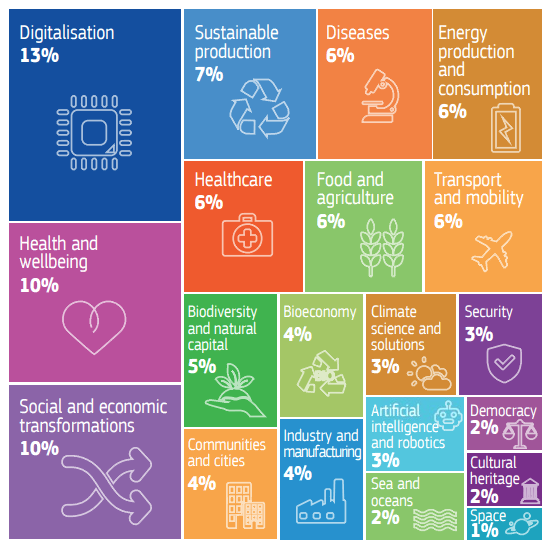
Proposed 'mission themes for Horizon Europe. Share of proposals received under each theme (%). On April 17, 2019, the European Parliament approved a provisional agreement on the European Commission's proposal for "Horizon Europe", an ambitious 7-year €100 billion research and innovation programme that will succeed "Horizon 2020".
Action plan for Sustainable Finance
The action plan for sustainable finance announced on June 2019 by the European Union aims to alleviate Europe’s major challenges on this issue, namely the lack of information and awareness of investors when it comes to long-term investments, risk management for sustainable development, as well as a lack of transparency.
Already in 2014, the EU had adopted a directive on the publication of non-financial information and information regarding diversity (Directive 2014/95/EU) inciting large public-interest entity (companies, banks, insurance brokers and any organisations designated as such by member states) with more than 500 employees and total assets of €20 million or a net revenues of €40 million to publish their exposure – and contribution – to sustainability risks. In other words, this measure covers both the impact of companies on sustainable developments, as well how they may be affected by social, climatic and economic challenges.
Following the adoption of this directive, the European Commission published, in 2017, its guiding principles on the reporting methodology for non-financial information to comply with the requirements of the Directive (C(2017)4234 final). The objective of these guidelines is to help companies to publish relevant and cross-referenceable environmental, social and governmental information to favour resilient sustainable and transparent European growth.
In June 2019, following a public consultation launched as part of the action plan for sustainable finance, the technical experts group established by the EU Commission released several publications. The latter concern the final reports on EU taxonomy (TEG report on EU taxonomy) and the European norm for green obligations (EU-GBS), as well as an intermediary report on climatic standards (TEG report on EU green bond standards). Consequently, the European taxonomy now established a classification of financial activities according to sustainability criteria. The Commission has also enriched its guiding principles regarding extra-financial reporting by formulating additional climatic recommendations.
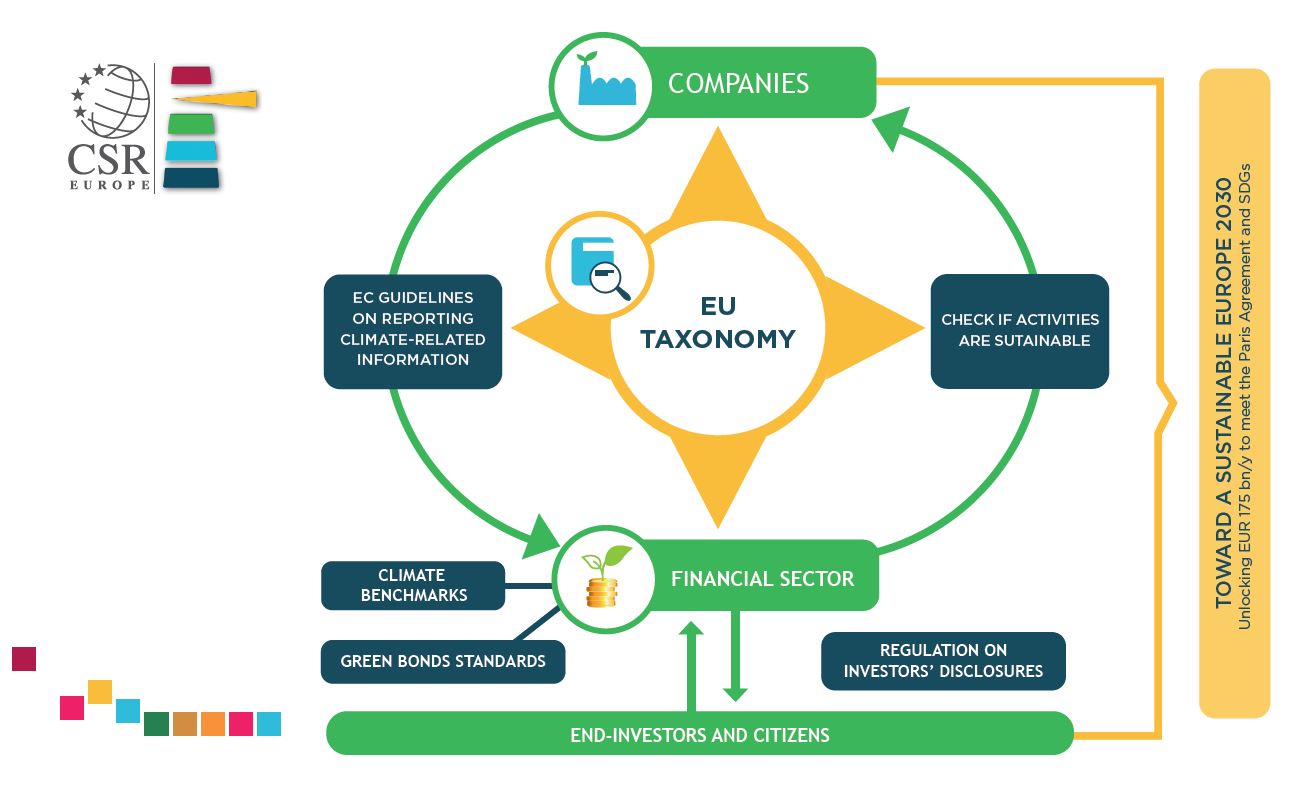
Overall, experts agree that the action plan is yet to achieve a high enough level of prescription to create the desired commitment by the companies targeted by the directive. To stimulate this commitment and adapt it to the European expectations, the Commission proposed the implementation of the “European Corporate Reporting Lab” and is already thinking about the next revisions to amend the directive based on the progress to be observed in the coming years.
Impacting both investors and corporations, these changes are shaking up the relationships between companies and financial markets: companies and projects whose activities will correspond to the requirements of the taxonomy will have greater leverage to mobilise capital to finance them. Inversely, companies who will not align with these requirements will no longer be able to showcase their activities as sustainable, rendering them less attractive to investors (see page 28).
These new guidelines fit into the framework of the efforts deployed by the Commission to ensure that actors in the financial sectors, with private capital, can play their determining role in the transition to a climate-neutral economy financed through sustainable investments. Nearly 6000 companies are concerned by the application of the directive.
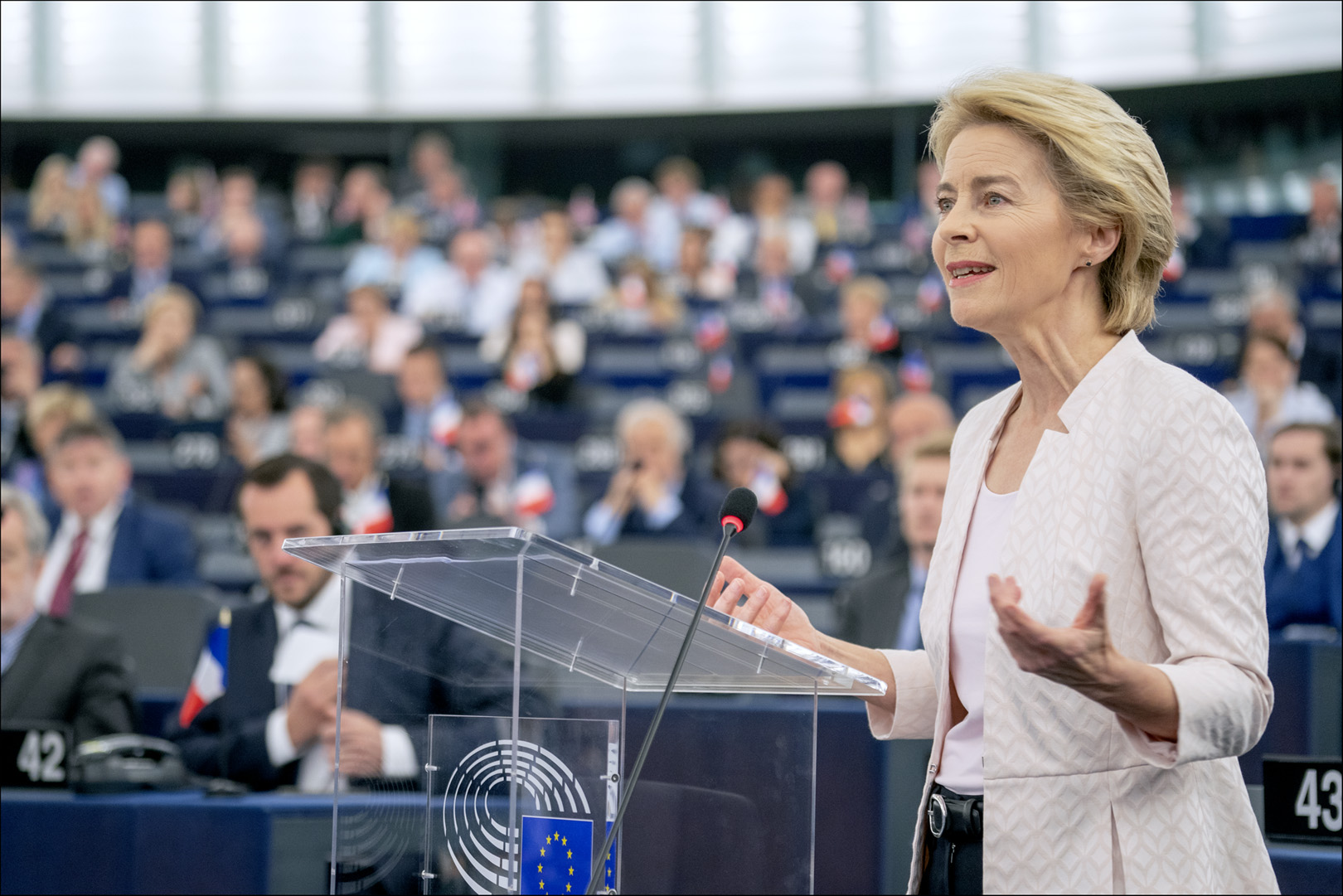
Ursula von der Leyen presented her programme to the European Parliament on 16 July before being elected President of the Commission.
Conclusion: toward a new European narrative
The stakes are increasingly pressing. The relationship between economic growth and planetary boundaries, the integration of the social component in the ecological transition, the necessity to redefine work as populations grow older and the world grows more digitised… The complexity of the necessary changes resides in the idea that they require a holistic approach which understand the deep interconnection between these challenges, as opposed to a silo mentality. The magnitude of these challenges calls for the end of the status quo and of “business as usual”. And the European Union is moving forward, often taking up the frontrunner position on many of these issues.. But it also needs to accelerate and to undertake a historic turn to take up the opportunity of a transition to a new model, a positive projection offered to European citizens seeking renewal. The threat of disengagement and scepticism which weighs on the action and very existence of the Union don’t leave it with much choice but to commit fully to this new storyline for Europe. It could well be that the new President of the Commission, Ursula von der Leyen, has heard this message, as she ambitiously stated in her “My Agenda for Europe” speech:
"Europe must lead the transition to a healthy planet and a new digital world. But it can only do so by bringing people together and upgrading our unique social market economy to fit today’s new ambitions."
(A Union that strives for more - My agenda for Europe. Ursula von der Leyen).
-Article initially published on September 2019-
To be read also in the dossier "Small and Bigger Steps Towards a Sustainable Europe":




